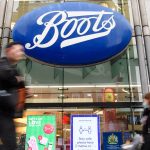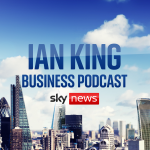Britain’s economy grew by 2.3% in April as the high street and hospitality sector reopened, official figures show.
That meant that GDP was a record 27.6% larger compared with the same month last year when the nation was in the grip of the first coronavirus lockdown.
Chancellor Rishi Sunak hailed it as a “promising sign that our economy is beginning to recover”.
Live COVID updates from the UK and across the world
The data from the Office for National Statistics (ONS) covers a period when non-essential retail as well as outdoor drinking and dining were allowed to resume – on 12 April.
It followed a subdued start to the year when latest lockdown measures had sent the economy into reverse gear.
The ONS said that April’s monthly growth was the fastest since July last year, when businesses were reopening after the initial period of coronavirus restrictions.
But it still left gross domestic product (GDP) 3.7% below its pre-pandemic peak of February 2020.
Jonathan Athow, ONS deputy national statistician for economic statistics, said GDP was boosted by strong growth in retail spending as well as schools – which had returned in March – being open for the full month, and the start of the reopening of the hospitality sector.
There was also an increase in car and caravan sales as well as negative one-off factors such as car plant shutdowns and oil field maintenance.
Please use Chrome browser for a more accessible video player
Meanwhile, trade friction following the end of the Brexit transition period continued to have an impact.
“Exports of goods have now, broadly, recovered from the disruptions seen at the beginning of the year,” Mr Athow said.
“However, imports of goods from the EU are still significantly down on 2020 levels.”
Monthly imports from non-EU countries were the highest since records began in January 1997, the ONS said.
The chancellor said: “Today’s figures are a promising sign that our economy is beginning to recover.”
But he added that, while a million people had come off furlough across March and April, many workers still required continued support.
The COVID-19 pandemic resulted in GDP shrinking by nearly 10% in 2020, the biggest collapse in 300 years.
Forecasters predict that as Britain emerges from the crisis it will see a consumer-led bounce back with the fastest pace of growth since the Second World War.
Please use Chrome browser for a more accessible video player
But there are fears that a delay to the 21 June date for the end of lockdown measures could hold back the recovery.
UK GDP shrank by 1.5% in the first quarter though on a monthly basis the economy has been recovering ever since a 2.5% contraction in January, posting growth of 0.7% in February and 2.1% in March.
April’s growth figure was broadly in line with economists’ expectations.
Thomas Pugh, UK economist at Capital Economics, said: “The jump in GDP in April was another sign that consumers are raring to spend as the economy reopens.
“GDP is on track to return to its February level before the end of the year.
“If anything, the economy could regain its pre-crisis level even sooner.”






















